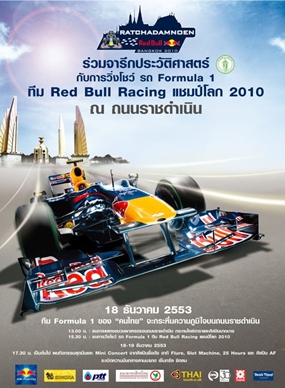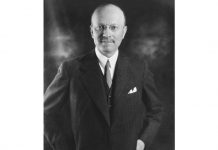The financial pages of the Bangkok Post had an item regarding the desire of some government offices to see an F1 race in Thailand, and that to be a round the houses in Bangkok.
It was reported that 150,000 people came to see the demonstration by Red Bull with an F1 car along Ratchadamnoen Avenue, helping to validate the claim that Thailand will bid to stage a Formula One race in future, to help spur tourism and meeting businesses, according to the Thailand Convention and Exhibition Bureau. TCEB president Akapol Sorasuchart said the agency was responding to calls to hold major events to enhance the country’s reputation. Next year, 20 countries will hold F1 races, and the TCEB is looking at other Asian countries such as Malaysia, Singapore, China, India, Japan, South Korea and Abu Dhabi which already have rounds of the F1 series.
 Red Bull F1 in Bangkok
Red Bull F1 in Bangkok
“Building an F1 circuit is very costly but it would be useful after the races end,” said Akapol. “I think that street racing is interesting for Thailand because it involves lower investment. A good location would be Ratchadamnoen Avenue because it has a good atmosphere.”
Will we be next to line Bernie’s pocket? Possibly, as the Red Bull Chalerm Yoovidhya is at the helm of a company that could afford it, but would Bangkok be prepared to meet the annual (usurer’s) fees.
The news was also picked up by one of F1’s senior journalists, Joe Saward, who ventured the following opinion:
“The goal now is to rebuild the tourist business and attract worldwide attention and so Formula 1 is a logical step. The plan is to research the effects that F1 could have on the Thai economy and then decide on whether to bid. There is much competition for races in Asia with events in Malaysia, Singapore, China, India, Japan, South Korea, Abu Dhabi and Bahrain. A demonstration run in Bangkok recently by Red Bull attracted huge crowds. The government is looking closely at Singapore’s experience, which has transformed the city’s reputation, even if the race itself is not so popular with the locals because of the disruption caused by the street closures. The Thais must decide whether it is worth building a circuit, or extending an existing facility or running a street race. Street races involve smaller initial investment but cost more in the longer term. The bureau may wish for a race in Bangkok, but it might be wiser to extend the 1.5-mile circuit near the seaside resort of Pattaya, which was built in 1985 and is named after Prince Birabongse Bhanutej Bhanubandh (known in Europe as “Prince Bira”) who raced Grand Prix cars with some success in the 1940s and 1950s. This is currently not suitable for Formula 1. There were plans as long ago as 1939 for a Grand Prix of Thailand, which was being planned by Prince Bira. Sadly that event never happened as World War II broke out a few months before it was due to happen.
“The Thais have one major advantage over rival countries. The Red Bull company is 51 percent owned by Chaleo Yoovidhya (who owns 49 percent) and his son Chalerm (who owns two percent). Dietrich Mateschitz owns the remaining 49 percent, but runs the business, leaving the Thais to market their original energy drink Krating Daeng (on which Red Bull is based) in the Asian markets. Chaleo is now the richest person in Thailand, with a fortune estimated at $4 billion. Money from a public-private partnership could thus be found… so long as politics do not get in the way.”
We shall see what eventuates over the next 12 months, but I wouldn’t be holding my breath.




